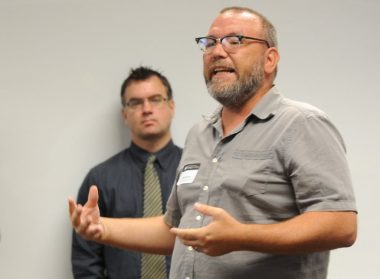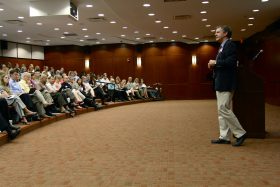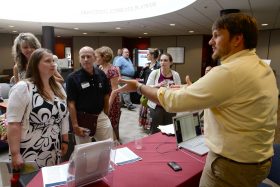Elon University hosted its 8th annual Teaching and Learning Conference this month as more than 250 faculty, program directors and administrators from 34 area colleges and universities examined student learning and faculty roles in creating active and engaged learning environments, as well as the technologies that support these environments.

More than 100 new and existing Elon faculty and staff also attended the “Thresholds to Learning” conference on Aug. 18, which featured a morning and afternoon plenary focused on theory and practice, led respectively by Ray Land of the University of Strathclyde in Glasgow, Scotland, and “The Rev.” Jim Groom, an instructional technologist and Web 2.0 guru from Mary Washington University in Fredericksburg, Va.
The conference also featured 12 interactive sessions on a variety of topics, from the practical issues like grading to emerging possibilities including 3D virtual environments for education. Faculty and staff from Elon and five other universities presented sessions during the conference.
In the opening plenary, Land, an internationally known scholar in teaching and learning, discussed student learning and “threshold concepts” in disciplinary understanding. Land argued that each discipline has certain essential ideas that must be mastered before a student can develop additional expertise in that field. While these “threshold concepts” vary across disciplines, they share characteristics that are important for faculty to consider as we plan our courses and curriculum.
To view Ray Land’s plenary “Threshold Concepts and Troublesome Knowledge” presented at the conference, go to: http://www.youtube.com/watch?v=lDniWoZFWgM

Groom closed the conference with a display of insight and humor, arguing that independent domains and open web tools provide students, faculty and people outside the university with opportunities to learn, express, exhibit and be discovered online without the encumbrance of institutional rules and regulations. He described how the University of Mary Washington applied simple blog technology to create a living nexus of teaching, learning business, information, and creative self-expression. The platform also enabled unprecedented participation in Mary Washington courses by people from around the world.
To view Jim Groom’s plenary, visit http://www.youtube.com/watch?v=a-mmmGMKmIg
A Technology Hall provided hands-on demonstrations of new and established technologies used throughout the conference. Posters highlighted services, applications and platforms available through Teaching and Learning Technologies, such as Lynda on-line training, learning management systems and social media.
Attendees were able to test-drive a range of e-readers and tablets from Nook to iPad, and see dozens of tweets being posted to a Twitter feed on a large video display. For the first time, both plenaries were video streamed for remote viewing, and are being uploaded to YouTube. Behind the scenes, TLT became its own customer by coordinating and providing presentation equipment and systems for the conference.

“This event culminates and strengthens the natural partnerships between TLT and CATL”, said Christopher Waters, director of TLT and assistant chief information office at Elon University. “I noticed many Elon colleagues taking notice of the depth of services we provide to our teaching community. The work we do in this area is important.”


